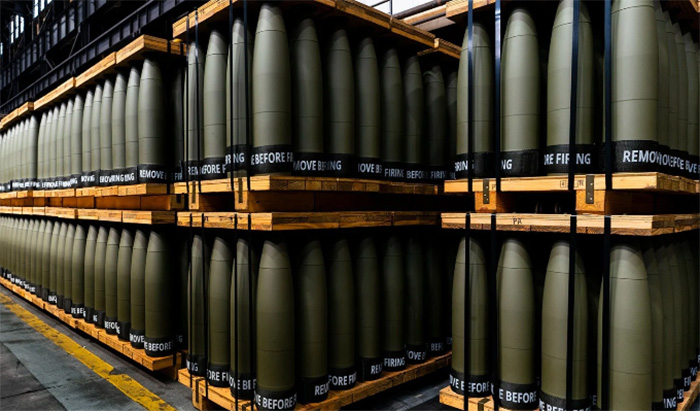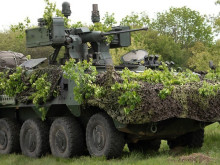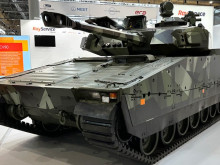Defence Committee expresses support for the Government of the Czech Republic to continue the Munitions Initiative
At yesterday's meeting of the Defence Committee of the Chamber of Deputies, members of parliament once again modified the agenda, adding a new item titled "Deployment of the Czech Army, professional soldiers, active reserves, and equipment during floods." On the other hand, several items were discussed by committee members in a closed session.

At the start of the meeting, Defence Committee discussed the deployment of soldiers to assist with the aftermath of the devastating floods in northern Moravia and southern Bohemia. Defence Minister Jana Černochová and Chief of the General Staff, Lieutenant General Karel Řehka, recalled that the army was fully prepared ahead of the floods. "Several hundred soldiers, with engineering equipment and helicopters, were on standby based on an agreement with the Fire and Rescue Corps. Our soldiers subsequently rescued dozens of people and, at the request of local governments, performed tasks such as sandbagging, erecting barriers, and helping rescuers reach affected areas. We even had crisis intervention specialists, including psychologists, on the ground," the minister explained. She also stated that reports of insufficient or delayed deployment of the army were untrue. General Řehka added that the army had deployed six helicopters, including Sokol, Mi-171, and the new UH-1Y Venom multi-purpose helicopter, which is fully equipped. He also noted that during the ongoing Ample Strike exercise, the U.S. Army lent its MQ-9 Reaper unmanned aerial vehicle, which surveyed the damage in the Krnov, Opava, Ostrava, and Jeseník regions. According to Řehka, the floods demonstrated that the Czech Republic has learned from past crises. "We have an excellent crisis management system that works," said the Chief of the General Staff, who also mentioned the deployment of a special operations helicopter unit in Poland, where Czech soldiers evacuated a large number of people at the request of the Polish authorities.
Josef Bělica, a committee member and Governor of the Moravian-Silesian Region, praised the readiness of the Integrated Rescue System and the Czech Army. He noted that the crisis legislation is well designed, and the system can be relied upon during emergencies. "As of 7 a.m. yesterday, 354 soldiers and 64 pieces of equipment had been deployed in the Moravian-Silesian Region. The involvement of the army’s veterinary team in the village of Zátor was crucial, as there was a significant problem with animal carcasses," Bělica said. "I want to thank the entire army, all soldiers, and all units involved. They did an incredible job. I would also like to express my gratitude to all components of the Integrated Rescue System and the entire crisis management team," he concluded.
The Munitions Initiative
The deputies then continued to discuss the Czech Munitions Initiative in a closed session. Among the attendees were Brigadier General Petr Bartovský, Director of Military Intelligence, and Aleš Vytečka, Director of the Agency for Intergovernmental Defence Cooperation (AMOS). After more than an hour of deliberation, the Defence Committee adopted the following resolution:
I. Takes note of the information on the Munitions Initiative undertaken by the Government of the Czech Republic to support Ukraine in resisting Russian aggression. This includes updates on the ongoing supply of ammunition, the supplier selection process, the procurement of ammunition at the donor country's request, and the current market prices of ammunition. The supplier handles all logistics with the Ukrainian end-user, while the Ministry of Defence of the Czech Republic coordinates communication with the donor country and assists with communication with the Ukrainian side.
II. Expresses its conviction that the Czech Republic's Munitions Initiative, which supports Ukraine's armed forces on the front lines, is vital for bridging the gap as EU and Western countries begin ramping up new ammunition production.
III. Notes that, given the nature and scale of the conflict, it is not appropriate to fully disclose all details of the munitions initiative, as doing so could compromise the security and foreign policy interests of the Czech Republic. However, the process is fully transparent to donors.
IV. Expresses its conviction that, based on the information received, the Munitions Initiative is being organized and implemented in a way that ensures the highest possible quality and quantity of ammunition supplies to Ukraine using funds from donors and the Czech Republic.
V. Expresses support for the Government of the Czech Republic in continuing the Munitions Initiative.

Current Developments in the Army’s Strategic Projects
Yesterday morning, a meeting of the Defense Ministry’s Acquisition Subcommittee also took place. Its chairman, Karel Krejza, told CZ DEFENCE that the subcommittee discussed a substantial agenda covering all Army acquisitions. "Everything is proceeding according to plan so far, and industrial cooperation is working well. For instance, regarding the CV90 vehicles, more than half of the promised industrial cooperation contracts have already been signed, and more are in progress," Krejza said. Concerning the implementation of the F-35 aircraft, Krejza mentioned that a team is being prepared for permanent deployment in the United States to work on deliveries and assist with training coordination. "We also toured Čáslav Airport, and the findings are more favorable than we initially expected," added the chairman of the Defence Ministry’s acquisition subcommittee. The subcommittee also examined new acquisitions, such as a new vehicle for the engineer troops. "According to the deputy chief of staff, we will proceed with the usual competitive process," Krejza said. The cost of a new vehicle for special forces is also being evaluated. Krejza noted that some projects have been delayed. "For example, mortars or the modernization or replacement of Pandurs are still undergoing feasibility studies," explained Krejza, adding that the contract for the Embraer C-390 Millennium aircraft is expected to be signed soon.
Ensuring the Defence of the Czech Republic and Cyber Security
During the closed session, committee also received the Report on the Provision of National Defence in 2023. The Committee discussed two draft laws: an amendment to Act No. 222/1999 Coll., on the Provision of National Defence of the Czech Republic, and a government draft law on cyber security. The Committee suspended the discussion of both laws, which had already passed their first reading in the Chamber of Deputies, to allow for the addition of amendments and reasoned opinions from the Ministry. Everything should be finalized by October 25 of this year.
Providing defence
The purpose of the first amendment, as presented by Jan Jireš, Chief Director of the Defence Policy and Strategy Section of the Ministry of Defence, is to strengthen and enhance the defence capabilities of the Czech Republic. This will be achieved by improving its legal position regarding existing military facilities, allowing continued and necessary development. "The material is presented in response to the deteriorating security situation, not only in Europe, requiring a reassessment of how we ensure the combat capability and readiness of the Czech Armed Forces, which cannot be secured without functional military facilities—such as those used for ammunition storage or for training and accommodating soldiers," said Jireš. He explained that land restitution has resulted in the state not being the exclusive owner of land at key military sites, including ammunition depots. Property owners can then assert their rights against the Ministry of Defence, which is already happening. "For example, owners can demand disproportionately higher rents or insist their land be vacated, which poses a clear threat to the defence of the Czech Republic." Jireš outlined the Ministry of Defence's proposal:
- To allow the Ministry to purchase land and buildings for national defence purposes at market value, or up to four times the market price in special cases.
- The proposal also introduces a special expropriation measure to ensure that the state is the exclusive owner of essential military facilities, which was previously covered under the Construction Act.
This specifically pertains to ammunition depots in Čermná nad Orlicí, Dobronín, Travčice, and Týniště nad Orlicí.
General Řehka confirmed Jireš's statements: "It's not only that this restricts our ability to implement operational security measures, which affects real security, but it poses tangible risks. Expropriation is, of course, a last resort that nobody wants, but there are realistic scenarios where, for example, hybrid threats—common in Europe today—could result in restrictions on our defence capabilities. Land could be bought up, and under the current legislation, actions could be taken that would essentially make it impossible for us to operate." The Chief of the General Staff further warned that the original law from 1999 should have been amended long ago.
Cyber security
Lukáš Kintr, Director of the National Office for Cyber and Information Security (NÚKIB), introduced the law on cyber security. The goal of the new law is to bolster the Czech Republic's cyber security in response to the increasing number and significance of cyber threats. According to Kintr, the draft law maintains and develops on four basic obligations imposed on regulated persons. These obligations are:
- Reporting contact information
- Implementing preventative security measures
- Reporting cyber security incidents
- Executing countermeasures
The proposal also introduces new tools and processes. Based on practical experience, a new obligation is being introduced to determine the scope of cybersecurity management. Providers of the most critical services to the state must now secure and track information about their suppliers when security-related services are involved. "The original Cyber Security Act was built on the principle of minimizing state intervention, applying only to entities of critical importance within the Czech Republic. However, under the NIS2 Directive, the number of entities will increase, and it may seem that the new draft law departs from the principle of minimal state coercion. Nevertheless, we have tried to implement and rationally integrate NIS2 provisions into Czech law. Many debates are still ongoing because parts of the NIS2 Directive are very general and unclear," said the director of NÚKIB Kintr.
His words were supported by Lieutenant General Karel Řehka, a former head of the NÚKIB. He emphasized that cyberspace is now one of the operational domains, citing Russia's cyber operations before its invasion of Ukraine in 2022 as an example. "Between 2011 and 2023, we witnessed numerous attacks on ports in Europe, America, Asia, and Africa. In 2023, for instance, an attack on a Norwegian supplier affected thousands of ships in the shipping industry. Poland also reported a cyber attack in 2023 that disrupted rail traffic near Szczecin, stopping about 20 trains for several hours," General Řehka explained. He also highlighted the impact of supply chains on the economy and society's resilience. "A country cannot be secure without a functioning economy. Methodologies and benchmarks for societal resilience are being developed, as our defence strategy clearly states that national defence is not solely the responsibility of the armed forces but involves the entire society. A resilient society is absolutely crucial; without it, there is nothing to defend," General Řehka concluded.
Conclusion of the meeting
At the end of the meeting, the Chief of the General Staff of the Czech Armed Forces, Lieutenant General Řehka, highlighted during the discussion of the government's decision on overflights and the passage of armed forces from other countries through Czech territory that he aims to use these movements next year to train the Czech army as a host nation (Host Nation Support). "When we have a large exercise next year, where we will practice our defense from the strategic to the tactical level, we, on the contrary, have appealed to some allies to conduct their movements through our territory to test the system to its maximum capacity," General Řehka explained to the members of the Defence Committee.
This time we asked Committee a poll question, whether it is appropriate for the Czech Munitions Initiative is discussed in the public space?
Lubomír Metnar (ANO), Chairman of the Committee
Where public money is used, a public debate on the effectiveness and legitimacy of its use is entirely appropriate. It is a democratic form of oversight of public fund management.
Josef Flek (STAN), Vice-Chairman of the Committee
In a war, it’s impossible for both sides to transparently reveal what weapons they have, their numbers, and who supplies them—that would be sheer madness. We might as well send the information directly to Putin. The Czech Munitions Initiative operates as an 'honest broker'—we collect bids, and an independent commission evaluates them. It’s purely about supply management, and we act as the middleman—a diplomatically valued one at that. The call for transparency is a sneaky tactic from the government’s opponents. They know that releasing unnecessary information can help Russia and endanger Europe.
Pavel Růžička (ANO), Vice-Chairman of the Committee
We live in a democratic society, and any topic is fair game for public debate. However, the real issue is what information is ultimately shared with the public. The public should know how much money the Czech side is investing in the munitions initiative and how much ammunition is being purchased. If everything is kept secret, it raises many doubts.
Jiří Hájek (STAN), Member of the committee
Personally, I fully support the Czech Munitions Initiative, and I am glad it has been successful. The public should be informed about matters that impact citizens' lives. However, when it comes to the strategic security of the state, and thus its citizens, I would be very cautious about publicly disclosing sensitive details.
Jiří Horák (KDU-ČSL), Member of the Committee
In my opinion, the basic outlines of the initiative, such as the Czech state's financial contribution or the general goals, should be publicly communicated. However, detailed information about ammunition purchases by third countries cannot be shared by the Czech side if those countries don’t want it disclosed. In other words, we are bound by obligations to our alliance partners and cannot release information concerning them without their consent.
Karel Krejza (ODS), Member of the Committee
Yes, but only to a certain level of detail. We have an ally and we publicly declare our support for him, whatever emotions that brings. Just as President Zelensky goes around Europe asking for support, so did Benes 80 years ago. We are a small nation that has been helped to independence and we have a moral obligation to reciprocate. After all, Ukrainians working in our country take that help in taxes, and more than that. We are not slaving away like other countries that are tied to Russia like an umbilical cord by oil and gas pipelines. I recommend that anyone who wants to understand how crucial energy is, listen to the Russian military's song 'We will stop Ukraine and Europe's gas' on YouTube. Perhaps voters will one day understand how geopolitically and strategically important it is to cut ourselves off energetically from blackmailing Russia. With gas, our government has already succeeded in diverting us this year; with oil, it will be next year.
Radovan Vích (SPD), Member of the Committee
The Munitions initiative, which has been running for more than two years and to which (according to available information) the government of Petr Fiala has so far sent financial contributions of CZK 865 million, has not met expectations. If about 100,000 artillery rounds have been purchased so far, then that's about 14 days of combat activity for Ukraine at the moment. Of course, it is important to have a public debate on this matter and to have proper scrutiny by the parliamentary opposition.





















